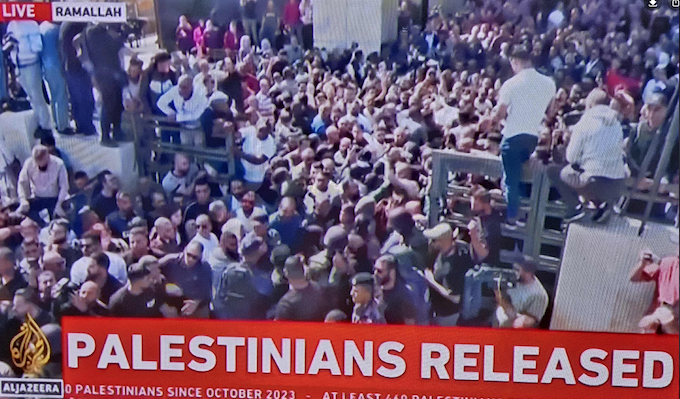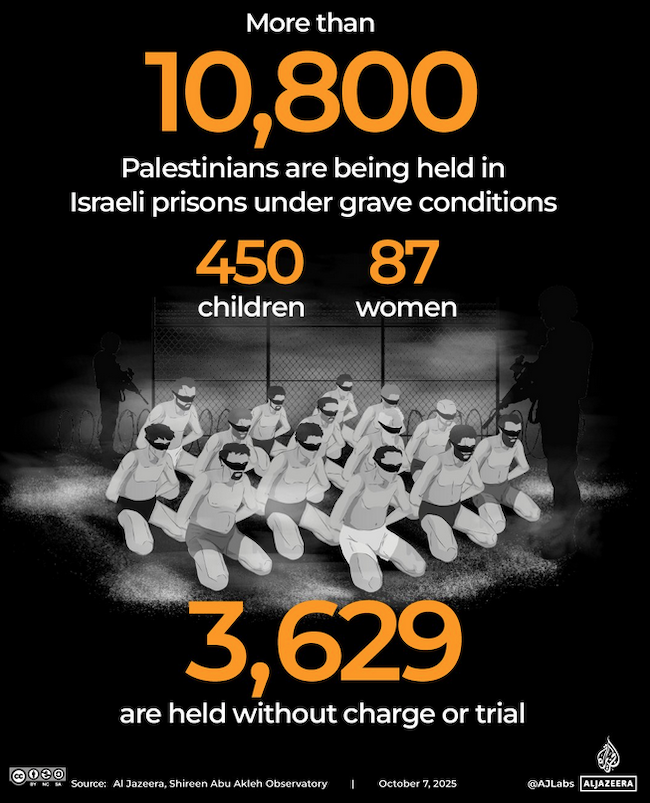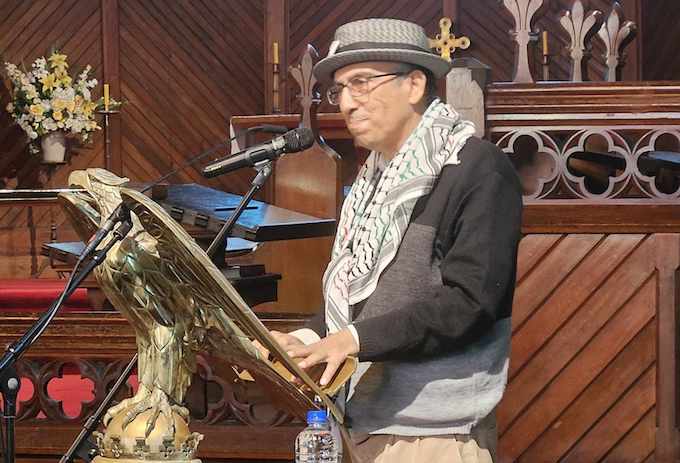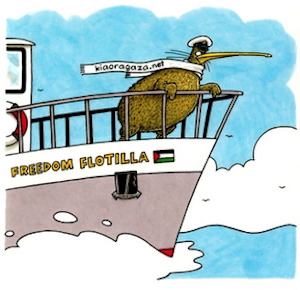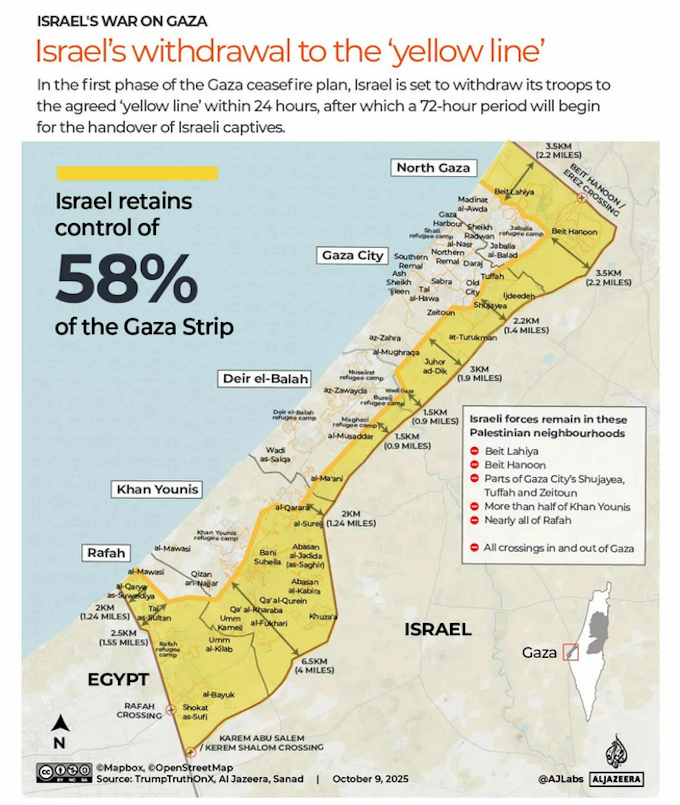COMMENTARY: By Eugene Doyle
Israel and the West pretend they want a real peace in Israel-Palestine yet the Israelis have beaten unconscious the man most likely to help realise a sustainable end to the conflict: Marwan Barghouti.
The ethnocentrism of Western culture is such that 20 Israeli hostages received vastly more coverage than thousands of Palestinian hostages, nearly 2000 of whom were released as part of the recent exchange.
These prisoners, physically emaciated, most emotionally shattered, many children, most having never been charged, some held for decades, emerged from the Dantesque Inferno of the Israeli prison system. Most had some kind of disease, commonly scabies, due to the infested and infected conditions of the gulag.
- READ MORE: Eugene Doyle: Saving Palestine’s Marwan Barghouti is our duty
- ‘We fear for my father’s life’: Marwan Barghouti’s son to Al Jazeera
Five Palestinian detainees released and exiled to Egypt brought with them terrible news: the great Palestinian leader Marwan Barghouti — the person most likely to lead a free Palestine — had recently been beaten unconscious by his captors.
According to the Times of Israel, Security Minister Itamar Ben-Gvir who oversees the Israeli Prison System says he is “proud that Barghouti’s conditions have changed drastically”.
What Nelson Mandela would say about the beating of Marwan
Marwan Barghouti — Palestine’s most loved and revered leader, a living symbol of the resistance — was beaten unconscious by 8 Israeli guards, according to the testimony of fellow prisoners on arrival in Cairo. The attack left the 66-year-old with broken ribs and head injuries.
When called on to demand his protection, British Prime Minister Keir Starmer and other Western leaders yawned and looked the other way. That response defined the depths that the Western world has reached in its permissiveness of violence towards Palestinian prisoners.
Marwan Barghouti is commonly referred to as the Palestinian Mandela, a man who has the attributes to not only unite the many Palestinian factions but also negotiate a lasting peace, if given the opportunity.
Mandela couldn’t have been “Mandela” without him surviving and being released — which is a tribute to the ANC and other fighters for freedom, as well as to the global boycott, divestment and sanctions campaigns that finally convinced the regime to negotiate.
The same was true of the Good Friday Agreement for Northern Ireland which saw the release of prisoners that one side considered terrorists. The British also came to accept that negotiation with leaders like Gerry Adams and Martin McGuinness of the IRA was essential precisely because they had the street credibility to deliver peace.
It is worth pointing out that Mandela said he was not personally beaten during his 27 years of captivity by the racist South African apartheid regime.
Barghouti, who has spent the last 23 years in prisons has had at least four beatings by the Israelis in the past three years alone. The Israelis have shown nothing but contempt for the Geneva Conventions, the laws of war, Red Cross requests, or any benchmark of human decency.
They are our “friends and allies” with whom we share values.
‘He has been in a struggle for 50 years’. Video: TRT News
Rules on prisoner treatment
After leaving Robben Island to eventually become South Africa’s first black President, the convicted terrorist and revolutionary Prisoner 46664 helped author the Nelson Mandela Rules on prisoner treatment, adopted by the United Nations in 2015. He had seen the mistreatment of many of his comrades by racist white South Africa, a close ally of most of our governments.
The scale of what is being done by Israel in its mass torture centres would be beyond anything Mandela could have imagined. Unlike morally repellent leaders like New Zealand’s Luxon, UK’s Starmer, France’s Macron or Germany’s Merz, he would never have failed to act.
A central tenet of the Mandela Rules is that people behind bars are not beyond human rights. Countries — and, yes, that includes Israel — must adhere to minimum standards such as, “No prisoner shall be subjected to, and all prisoners shall be protected from, torture and other cruel, inhuman or degrading treatment or punishment, for which no circumstances whatsoever may be invoked as a justification.”
Recently released Palestinians, most in shocking physical condition, talked of having to drink toilet water, beatings, being denied medical treatment, constant humiliations, including sexual violence, committed by the Israelis.
This kind of behaviour has long been documented by international human rights organisations, including Amnesty International and Human Rights Watch — and largely ignored by the mainstream media.
The Israelis, never forget, are our close friends, with whom we share “values”.
I have written a number of articles about Marwan and, to avoid repetition, I recommend those unfamiliar with his astonishing story to read them. My last article, Saving Marwan Barghouti is our duty, in August, was part of a global push to prevent Marwan facing further mistreatment. I was shocked at the time to see the video that Israeli Minister Ben-Gvir posted to show the power he personally had over Marwan whose physical condition had obviously deteriorated to a terrible extent. Now he has been beaten, for the fourth time.
“It is a clear declaration that they are threatening my father’s life,” his son Arab Barghouti said this week.
Prisons are ‘Israeli sadism in a nutshell’
One person who watched the release of the prisoners last week was veteran Israeli journalist Amira Hass, correspondent on the Occupied Palestinian Territories for Israel’s leading newspaper Haaretz.
“It was a kind of parade of skeletons,” Hass said. “These last two years, it’s like the Israeli prisons have become Israeli sadism in a nutshell,” she told Democracy Now!.
“The way that prisoners were treated during these two years is unprecedented in Israel. They didn’t only come out emaciated; they came out ill, sick. Some of them have lost limbs. It’s indescribable.”
Hass’s own parents were Holocaust survivors, her mother surviving nine months in the notorious Bergen-Belsen concentration camp. Now, along with all of us, she is witness to genocide.
She makes the fine observation that people aren’t born cruel; they become so. I would add: we in the West helped the Israelis become so depraved by ignoring their abuses for so long. Former human rights lawyer Keir Starmer is a case in point.
In the UK Parliament on October 14, Green MP Ellie Chowns asked Starmer:
“Can I ask the Prime Minister what recent representation his government has made in the last few days to secure the immediate release of Mr Barghouti, given his widespread popularity as a unifying voice for Palestinian rights, dignity and freedom, and therefore his potential crucial role in securing a meaningful and lasting peace in the region?”
Starmer is an avatar for the West: complicit in genocide and disturbingly detached from the suffering of the Palestinian people.
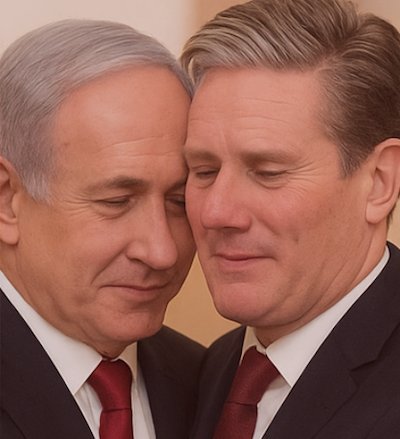
Starmer, who has less human decency in his entire being than Nelson Mandela had in one nostril hair, refused to even mention Barghouti by name. His lawyerly reply:
“Thank you for raising the individual case. We offer to provide such further information as we can, as soon as we can, in relation to that particular case.”
Western leaders, including in my own country, have refused to even reply to requests that petitions/insistences be made to the Israelis to save the great Palestinian leader. They have shown more empathy for the remains of deceased Israeli hostages crushed under the rubble of buildings bombed by the Israelis, hypocritically blaming Hamas for not releasing the remains fast enough!
Such is the moral calibre of our leaders.
None of them, it should be pointed out, had anything to say when footage appeared of Israeli soldiers committing gang rape at Sde Temein Prison last year. Not only were the men not punished but by week’s end they had been blessed by Benjamin Netanyahu’s spiritual mentor Rabbi Meir Mazuz who assured one of the rapists that he had done “no wrong” and “In another country they would have given him an award”.
Never forget, the Israelis are our close friends and allies with whom, our leaders tell us, we share values.
‘Israel doesn’t want peace – they want ethnic cleansing’
Such is Marwan Barghouti’s standing that he is respected by all Palestinian factions and acknowledged as a unifying figure, a peacemaker and someone who should be leading Palestine not getting his head punched by Israeli thugs.
“That’s why they see him as a danger,” says his son, Arab Barghouti. “Because he wants to bring stability, he wants to end the cycle of violence.
“He wants a unifying Palestinian vision that is accepted by everyone, and the international community as well. But they’re [Israelis] not interested in any political settlement; they’re only interested in ethnically cleansing the Palestinian people.”
True words, those — and they demolish the fake narrative peddled by Netanyahu and other Israeli leaders that there was “no partner for peace” on the Palestinian side.
The Israelis have killed so many Palestinian negotiators, so many Palestinians leaders that the opposite is now clear: the Israelis and the West are the true enemies of peace.
I’ll give the last word to another Palestinian. I dedicate it to Keir Starmer, Christopher Luxon, Anthony Albanese and all those other leaders who stand deaf, dumb and blind to Marwan Barghouti and the thousands of Palestinian souls still suffering in Israeli captivity:
“Then He will also say to those on the left hand, ‘Depart from Me, you cursed, into the everlasting fire prepared for the devil and his angels: for I was hungry and you gave Me no food; I was thirsty and you gave Me no drink; I was a stranger and you did not take Me in, naked and you did not clothe Me, sick and in prison and you did not visit Me.’
– Matthew 25, King James Bible
Eugene Doyle is a writer based in Wellington. He has written extensively on the Middle East, as well as peace and security issues in the Asia Pacific region, and he contributes to Asia Pacific Report. He hosts the public policy platform solidarity.co.nz.
This post was originally published on Asia Pacific Report.

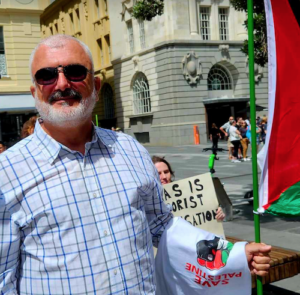
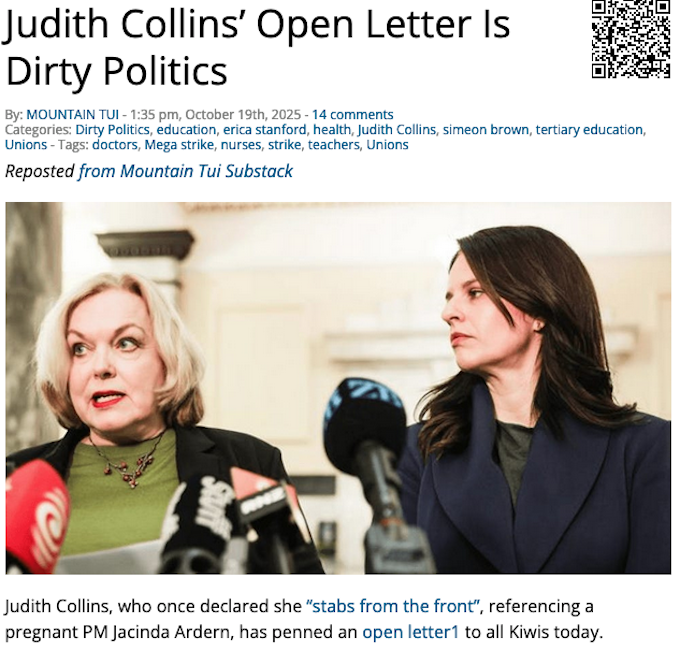
 (@OnlinePalEng)
(@OnlinePalEng) 




